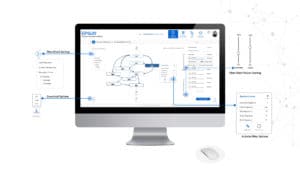As the global conversation about COVID-19 evolves from response to recovery to reopening and staying open, businesses are looking to automation now more than ever before. There is a swelling interest in the adoption of automation technologies, and an added urgency to boot. Robotic process automation (RPA) and artificial intelligence (AI) not only offer new and effective ways to optimize business processes, but they also help to mitigate the very kinds of risks and challenges the business world is currently facing. In light of all this, it’s not surprising then that automation is expected to grow quickly with wide-reaching impacts.
Automation for Risk Mitigation
Global events have global impacts. In the case of COVID-19, most businesses’ strategic plans did not anticipate the extreme supply and demand shocks (among other unforeseen market changes) that accompanied the spread of the virus. After experiencing the volatility, however, business leaders will be forced to reckon with this risk, taking into account how work will get done in the face of extreme disruption.

Beyond managing the risk of disruption, automation allows businesses to rethink the logistics of labor, optimizing for location, skills, and efficiencies in a way that balances human and digital workloads.
Planning for the Long Haul
While major world events tend to create immediate action and reaction, one of the lessons of COVID-19 is to be prepared for the unknown unknowns, which requires taking a longer-term view. Businesses must, of course, do what they need to in order to survive now. But they should also build for flexibility and adaptability moving forward.
As organizations look to reopen (if they haven’t already), they should also look to revisit their automation plans in the context of this longer view. Re-prioritize where needed to best support recovery, retest the impacts and reconsider the dynamic of automation in the context of unforeseen circumstances.
Planning for the People
In the same Forrester report, the author reminds business leaders to continue prioritizing their most important business asset: people. Approaching automation with empathy means putting people at the forefront of every conversation.

It means seeking opinions from others, committing to transparency, supporting the human workforce’s needs, and most importantly, trusting the people who make work happen. By starting with empathy, business leaders build confidence and trust, creating a positive healthy working environment in which everyone feels empowered to do their best work.
If you’re looking for more, we can help. Schedule a free demo today.

